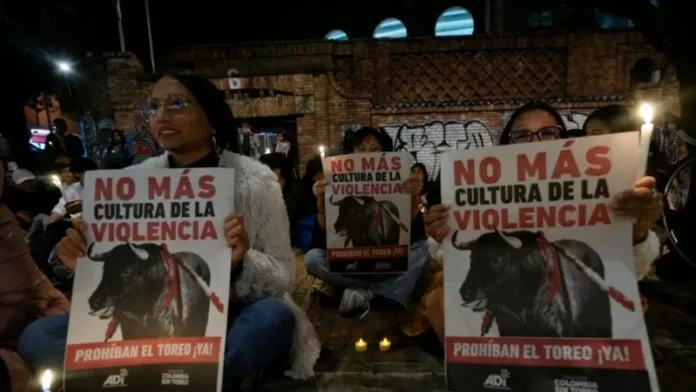BOGOTA, Colombia — The Colombian congress has taken a historic step towards animal welfare by voting to ban bullfights in the country. This decision has dealt a serious blow to a centuries-old tradition that has been a part of Colombian culture for generations.
The bill, which was passed on Tuesday, calls for the banning of bullfights within a three-year period, making it illegal by the start of 2028. This move has been welcomed by animal rights activists and those who have been advocating for the end of this cruel and outdated practice.
The ban on bullfights has been a long-standing issue in Colombia, with many people speaking out against the violence and suffering inflicted upon animals for the sake of entertainment. President Gustavo Petro, a vocal opponent of bullfights, now needs to sign the bill into law for it to take effect.
Bullfighting originated in the Iberian Peninsula and is still legal in a handful of countries, including Spain, France, Portugal, Peru, Ecuador, and Mexico. However, the practice has been facing increasing criticism and opposition in recent years, as society’s views on animal welfare continue to evolve.
Once a popular event, bullfights were broadcast live on multiple television networks. However, as more and more people became aware of the cruelty involved, the tradition has lost its appeal and support. The ban on bullfights in Colombia is a significant victory for animal rights organizations and activists who have been working tirelessly to transform society’s perception of this barbaric practice.
Terry Hurtado, an animal rights activist and city council member in Cali, has been leading protests against bullfights since the 1990s. She expressed her relief and joy at the passing of the bill, stating, “This ban is a huge victory for organizations that have worked to transform society and reject violence against animals. I am grateful that bulls and horses, which also participate in some bullfights, will no longer be tortured, and that children will no longer be exposed to this spectacle.”
In bullfights, a matador faces bulls that are bred to be aggressive. The matador taunts the bull with a red cape and eventually kills the animal with a sword after it has been injured with lances and daggers. This brutal and inhumane treatment of animals has no place in a modern society that values compassion and respect for all living beings.
In Colombia, where bullfights have been a part of the culture since colonial times, less than two dozen municipalities continue to hold these events. However, the annual bullfights in the city of Manizales still draw tens of thousands of spectators. While some may argue that this tradition brings in tourism and revenue, it is not worth the suffering and exploitation of innocent animals.
Bullfighting aficionados have described the ban as an attack on the freedoms of minorities and a problem for cities where these events draw large crowds. However, the ban on bullfights is not about taking away anyone’s freedom, but rather about promoting a more compassionate and ethical society. It is a step towards progress and a reflection of our evolving values as a society.
The decision to ban bullfights in Colombia sends a powerful message to the world that animal welfare is a priority and that we must put an end to practices that cause unnecessary harm and suffering. It is a victory for the voiceless animals who have been subjected to this cruel tradition for far too long.
In conclusion, the ban on bullfights in Colombia is a significant step towards creating a more humane and compassionate society. It is a victory for animal rights activists and a reflection of the changing attitudes towards animal welfare. Let us hope that other countries will follow in Colombia’s footsteps and put an end to this outdated and cruel practice.

